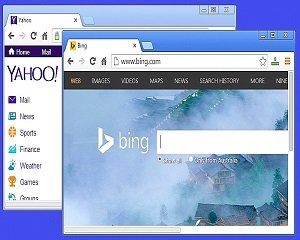Posted on Jan 29th 2014
in Search Engine Marketing
If, following our recent blog post about Yahoo, Bing and SEO, you’ve decided to go ahead and dedicate a little more time to these ‘alternative’ search engines, this is the post for you.
Worried about finding time to incorporate two more search engines into your already tight schedule? Don’t be: Yahoo search is powered by Bing, which means you can optimise for both sites simultaneously. And since the Bing and Google algorithms actually share quite a lot in common anyway, certain tactics such as optimising URLs for keywords and building high-quality do-follow backlinks are important for all three sites.
However, there are several major differences between the search engines that you need to be aware of:
Website Type
Google tends to push newer and more commercial websites up to the top of its rankings. Bing, on the other hand, has a preference for less commercial, more established websites, particularly those with more ‘official’ domain names such as edu. or .gov. In short, Google likes to serve up popular, socially relevant content for its mainly younger user base, while Bing is quicker to provide factual information.
Media-rich content
While Google gives preference to text-heavy sites and struggles to crawl and index rich media content such as Flash and Silverlight, Bing actually offers extra ranking credit for sites that make use of this kind of content.
Local Search
Google and Bing vary greatly in their approach to Local search, with Google tending to give favour to bigger, more established brands and Bing giving more sway to smaller businesses. The reason for this? When you make a search for local businesses on Google, it will offer up the results it considers the most credible, Bing however, assumes that you are looking for the company closest to you, which isn’t always the big chain name store in the centre of town.
Social Media and Social Search
While Google has been leading the way with ‘social search’ in recent years, Bing has been hot on its heels. In fact, Bing has perhaps been able to integrate social content into search even better than the search giant itself by actually giving searchers a chance to see if friends have rated or recommended a brand right there in search results.
Keywords vs. Context
Another major factor that sets Google and Bing apart is their attitudes to keywords. Google, particularly with recent algorithm updates, is much better at understanding the context and meaning of a page of content than Bing, who has a more traditional approach to SEO based on ‘matching’ keywords in meta tags, titles and page content. Some of these tactics are considered outdated to modern marketers focused on Google, context and searcher intent, but straightforward specific keywords still form an essential component of any SEO campaign focused on Bing/Yahoo.
An important thing to remember…
No matter what direction you take your SEO campaign, it’s important to remember that optimising for your guests is more important than optimising for any of the search engine key players. Securing a high ranking on the first or second page of the SERPs is great for your website’s traffic rates, but if all those visitors lose interest in your content once you’ve got them there, then all of your hard work is falling at the most crucial hurdle.
Once you’ve created a great, easy to use website with regularly updated, engaging content and professional, eye catching photography that shows off your property’s best features, optimising for Bing, Yahoo and Google will give as many of your guests as possible the best chance of finding you.
Do you include Bing and Yahoo in your property’s search strategy? Let us know in the comments below!
RELATED PAGES AND BLOG POSTS:

